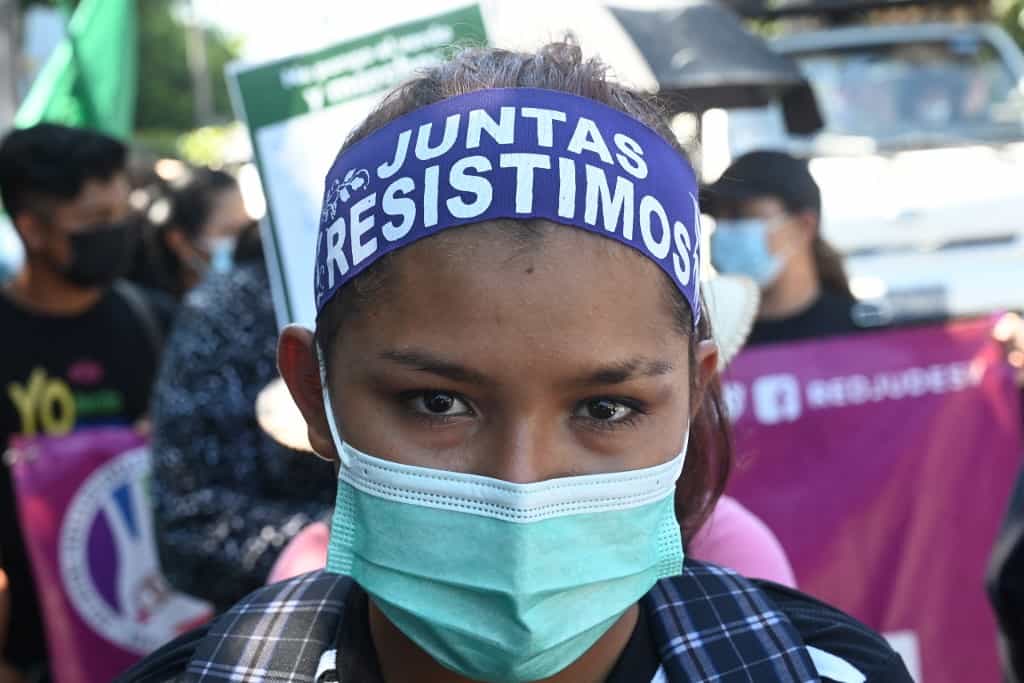Lilian was arrested at the hospital where she had just given birth, and Alba at the funeral of her baby. Accused of killing them, they were sentenced to 30 years in prison in El Salvador, where abortions and obstetric emergencies are punished as a crime.
Lilian spent eight years behind bars, and Alba ten. But their release, after a sentence review, is an incomplete victory for the women of a country that insists on maintaining one of the world’s strictest abortion laws.
“I had my baby normally, but I suffered a uterine tear. They sedated me to perform a curettage. Three days later when I woke up, I found out he had died,” said Lilian, who asks to be identified only by her name. She was 20 years old, had a two-year-old daughter, a partner, and a job when this happened in November 2015, at the public hospital in Santa Ana, in the west of El Salvador.
“They first accused me of abandonment and neglect, but the prosecution classified the crime as ‘aggravated homicide,’ and I was convicted in May 2016. I thought my life was ruined forever,” she recounted. A year ago, she says, she found out that her baby died of neonatal sepsis: “If they had treated her on time, she would not have died. I wouldn’t have lost so many years of my life in jail.”
Helped by the Feminist Collective and Citizen Group for the Decriminalization of Abortion, Lilian was released from prison in November and is the last of the 73 Salvadoran women sentenced to between 30 and 50 years in the last decade, for abortions or obstetric complications, to be released.
My World Collapsed
Although each has their own story, almost all these women are poor, with little education, and from rural areas, where health services are precarious, explained Arturo Castellanos, a social worker with the Citizen Group.
Some even suffered rapes, like Alba Lorena Rodríguez, who was raped by an acquaintance and became pregnant. She was 21 years old and had two small daughters. One day in December of 2009, with five months of gestation, she felt severe pains. Labor came on in her modest home in a rural area of southwest El Salvador.
“I had to give birth by myself, I fainted, he fell and hit himself,” she recounted. The next day, a neighbor called the police, and she was arrested at the wake of the creature. She did not have, she says, “a fair trial” nor someone to defend her. “I felt my world collapse because I knew I would not see the girls and I was being punished for something I hadn’t done,” she stated.
“The one who raped me was outside with his family, and I… imprisoned. The law is quite unfair,” said Alba, who, like Lilian, preferred to speak in San Salvador, far from her neighborhood. “When they leave jail, the community discriminates and stigmatizes them, and they must reestablish family ties,” explained Castellanos.
For Lilian, “the hardest part” was missing her daughter’s childhood, whom she left in the care of grandparents at two years old: “I only saw her twice, I didn’t see her grow up.” “My dad died in 2012, and I found out in 2019 when I got out (of jail), my girls were already going to school, and my sister had died,” Alba summarized.
The law remains the same
In Latin America, abortion is legal in Mexico, Argentina, Colombia, Cuba, and Uruguay. With three grounds also in Chile.
El Salvador banned abortion without exceptions in 1998, like Nicaragua, Honduras, Haiti, and the Dominican Republic. But in none are the penalties as severe: it is punished with two to eight years in prison, but it is often classified as “aggravated homicide,” which carries sentences of 30 to 50 years in prison.
Since 1998, the cases of abortion and obstetric emergencies of 199 women were criminalized, and although Lilian was the last to be released from prison, there are seven women facing accusation processes, not yet imprisoned, assured the Citizen Group.
“They enter being guilty in trials plagued with morality. Women continue to be criminalized. The law must be changed,” Castellanos insisted. But President Nayib Bukele, recently elected for another five-year term with almost total control of Congress, has spoken out against abortion.
“No one can give me back the lost time. I am rebuilding the bond with my daughter. I want to study and get her ahead. I would like to turn that page of my life and start from zero,” Lilian assured. She is aware that there is much to do so that other women do not suffer what she lived through.






